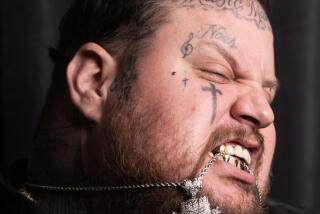‘Saturday Night’ Rocks Around Again : Eschewing the Band’s ‘70s Bubble-Gum Image but Not Its Music, Bay City Rollers Set Their Own Terms
- Share via
The tartan scarves and elephant bells rolled tothe knees. The gooney-bird hairdos and precious smiles. The screaming hordes of pubescent girls and silly photo layouts in 16 magazine.
Scottish teeny-bop rockers the Bay City Rollers, who perform Sunday night at the Coach House in San Juan Capistrano, rode to the top of the bubble gum-music pack in the 1970s. In Europe, they inspired an almost Beatle-esque devotion among their fans as “Rollermania” swept across the continent like a plague of saccharine sound.
But, as forecast in the group’s own “Yesterday’s Hero,” the Bay City Rollers were a fleeting if explosive phenomenon, hung out to dry and forgotten as a curious footnote in rock ‘n’ roll history just a few years after their peak.
Still, some nostalgia-hounds pine for the good old days, when empty-headed naivete and good, clean fun were still a part of rock ‘n’ roll. It’s this audience that the Rollers are targeting as they embark on their first U.S. tour since its heyday.
“We want to let the American people know that we’re still around,” said Rollers’ front man Eric Faulkner in a recent phone interview. “We’re quite curious to see how it goes, actually.
“The thing we’ve found so far is that the audience is a lot younger than you might expect. And where it used to be mostly young girls at our concerts, now a lot of guys come--college-age guys. You talk with them and it’s like, ‘My big sister used to have your records.’ They kind of got brainwashed by the family.”
And what better way to conjure up recollections of childhood than by listening to such dated but infectiously innocent echoes of the past as “Saturday Night,” “Money Honey,” “Rock and Roll Love Letter” and “I Only Want to Be With You”--Rollers hits featuring their signature chanting, relentless 4/4 rhythms and adenoidal vocalizing?
According to Faulkner, 38, this time around the Rollers are out to cast off their teeny-bopper image--an image he said the band never wanted, and one that went a long way toward destroying the members’ careers.
“That’s the main reason we disappeared, because we just couldn’t handle that any more, you know,” he said.
“We’d come up from the streets in Scotland, and the way we used to dress in the rolled-up jeans and plaid was very much a Scottish, street kind of fashion.
“What happened was the marketing guys watered the whole thing down. Looking back, it got totally out of control and taken away from us. The reason for our success in Europe to begin with was that it was a dead natural street thing. Some of our early gigs in Scotland were wild--there were fights, there were gangs, there were riots.
“I think in America, we ended up with this cutesy-cutesy type image, which we couldn’t handle. We’d do layouts for 16 magazine, and there’d be all these teddy bears laying about and we’d (want to say), ‘Get off--I’m 26 years old, you know!’ But we were too nice about it. We’d go, ‘All right--if that’s what you want.’ We didn’t see the fallout. But there you go--we were young, and that’s our only excuse.”
Young, unschooled and eager to please, the group members signed away many of their rights without realizing what they were doing, Faulkner said.
“When we’d try to change our image a bit, they’d come after us,” he said. “We’d signed (long-term) merchandising deals. At one show in Germany, we decided not to wear our plaids, and Christ--we had lawyers and attorneys all over us, saying we’d broken our deal.”
The pressures of Rollermania took its toll on the group. In 1976, it was widely reported that Faulkner tried to commit suicide by taking an overdose of drugs. He asserts that the incident was an accident.
“I’d just gotten into some uppers on the course of a tour, and then I got into some downers so I could sleep,” he said. “It wasn’t an ‘I can’t take any more of this’ kind of vibe, it was just one pill too many.
“It got blown up into a big P.R. thing, which was pretty pathetic and sad. And that was kind of the turning point for me, because it was like, if they can do this to me, they can do anything.”
Predictably, the overexposed, cozened group began to fall out of favor about a year after enjoying their biggest success with “Saturday Night” in 1976. Versions of the Bay City Rollers have existed more or less consistently since then, with varying degrees of success (they remain a huge attraction in Japan).
The Rollers’ current incarnation features original members Faulkner, Stuart Wood and Alan Longmuir, plus a new female vocalist, Kass. Faulkner stresses that although the band still performs all their old hits, fans shouldn’t expect an exact replica of what they remember from the ‘70s--particularly since original lead singer Les McKeoun is no longer in the band.
“It’s just a British kind of thing,” he said. “We never try to be anything but ourselves. We’ll do a good song whether it’s rock ‘n’ roll or a ballad. We still wear the plaids, but we don’t wear rolled-up jeans anymore.
“We don’t want to be a parody of what we were. Obviously, with all the time gone by, it’s changed,” he said. “We’d be wasting our time for the last 10 years if it hadn’t changed--you’ve got to move on, you know?”
* The Bay City Rollers perform at 8 p.m. Sunday at the Coach House, 33157 Camino Capistrano in San Juan Capistrano. $15. (714) 496-8930.
More to Read
The biggest entertainment stories
Get our big stories about Hollywood, film, television, music, arts, culture and more right in your inbox as soon as they publish.
You may occasionally receive promotional content from the Los Angeles Times.










